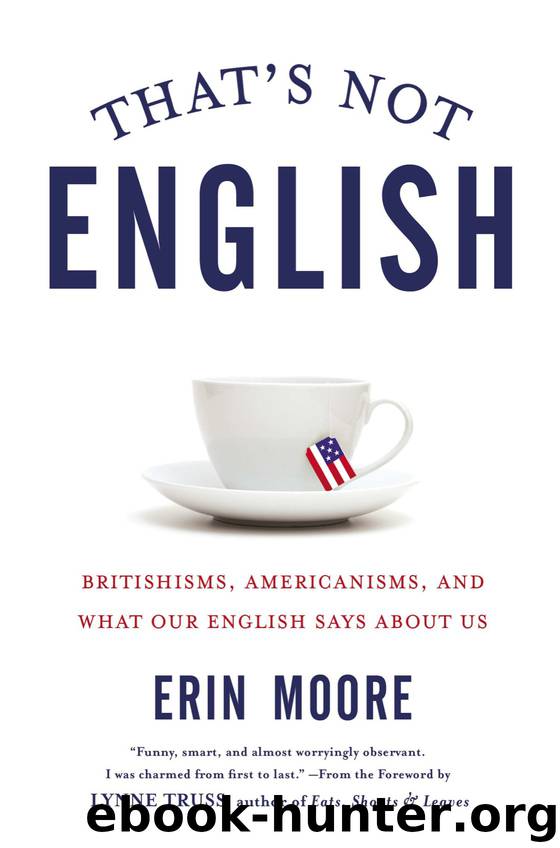That's Not English: Britishisms, Americanisms, and What Our English Says About Us by Erin Moore

Author:Erin Moore [Moore, Erin]
Language: eng
Format: epub
Publisher: Penguin
Published: 0101-01-01T00:00:00+00:00
So friends, let it be our endeavour
To make each by each understood;
For few can be good, like the clever,
Or clever, so well as the good.
Ginger
In which ancient conflicts and prejudices continue to make life difficult for English redheads.
I once read an amusing article about “beauty lag” that compared women’s grooming habits in London, New York, and Los Angeles. The farther west, apparently, the more lacquered and “done” a woman is expected to look. (London: fresh haircut, clean fingernails. New York: blowout, manicure. Los Angeles: all of the above plus highlights, pedicure, and fake bake.) My own experience bears this out. Yet standards of beauty don’t differ much from one side of the Atlantic to the other, with one exception.
A redhead in America will be considered enviable and special, if occasionally subjected to dunderheaded stereotypes about her supposed volatility or fiery temper. Children in the schoolyard will tease anyone for what makes him different, and red hair is no exception. But American associations with red hair include Charles Schulz’s little red-haired girl—the object of Charlie Brown’s affection in the Peanuts comics. She was based on an unrequited love of Schulz’s, and such was his reverence for the character that he never drew her, preferring to let her live in readers’ imaginations. In America, people with naturally red hair (who represent just 2 percent of the population) are widely imitated. Actresses like Christina Hendricks and Emma Stone have inspired a rush to hairdressers.
In England, by contrast, redheads are taunted and ridiculed for life, even subjected to random acts of violence. They are known as “ginger,” which is not merely descriptive but can be a term of abuse. American actress Jessica Chastain told GQ that while on location in Thailand, “I’d be walking down the street and people—British people—would stop the car and scream, ‘ginger!’ at me.” English model Lily Cole has also been bullied for her hair color. She told the Mail on Sunday: “I remember feeling very insecure. When I’d meet people, I would think they wouldn’t like me—that was an actual thought process—because I’m a redhead. It’s absolutely absurd.”
The dangers of “gingerism” go beyond bullying. Recent reports include a stabbing, a family forced to move twice after their children were teased mercilessly, a woman who won a sexual harassment suit after being targeted for her red hair, and a boy who committed suicide after being intimidated by other teens. These incidents prompted Nelson Jones in the New Statesman to ask, “Should ginger-bashing be considered a hate crime?” He argued, “If the concept has any meaning, it should apply irrespective of the personal characteristic, innate or adopted, cultural or sartorial, that inspires the hate.” The prejudice against this coloring has been likened to racism, and not only in jest, though one of the funnier examples is Australian (redhead) comic Tim Minchin’s song “Prejudice,” in which he sings of “a word with a terrible history . . . a couple of Gs, an R and an E, an I and an N.” His American audiences roar with relieved laughter when the word turns out to be ginger.
Download
This site does not store any files on its server. We only index and link to content provided by other sites. Please contact the content providers to delete copyright contents if any and email us, we'll remove relevant links or contents immediately.
Cecilia; Or, Memoirs of an Heiress — Volume 1 by Fanny Burney(32559)
The Great Music City by Andrea Baker(32020)
Cecilia; Or, Memoirs of an Heiress — Volume 2 by Fanny Burney(31957)
Cecilia; Or, Memoirs of an Heiress — Volume 3 by Fanny Burney(31943)
We're Going to Need More Wine by Gabrielle Union(19049)
All the Missing Girls by Megan Miranda(16032)
Pimp by Iceberg Slim(14511)
For the Love of Europe by Rick Steves(14129)
Bombshells: Glamour Girls of a Lifetime by Sullivan Steve(14077)
Talking to Strangers by Malcolm Gladwell(13374)
Norse Mythology by Gaiman Neil(13371)
Fifty Shades Freed by E L James(13243)
Mindhunter: Inside the FBI's Elite Serial Crime Unit by John E. Douglas & Mark Olshaker(9345)
Crazy Rich Asians by Kevin Kwan(9293)
The Lost Art of Listening by Michael P. Nichols(7506)
Enlightenment Now: The Case for Reason, Science, Humanism, and Progress by Steven Pinker(7314)
The Four Agreements by Don Miguel Ruiz(6766)
Bad Blood by John Carreyrou(6623)
Weapons of Math Destruction by Cathy O'Neil(6281)
